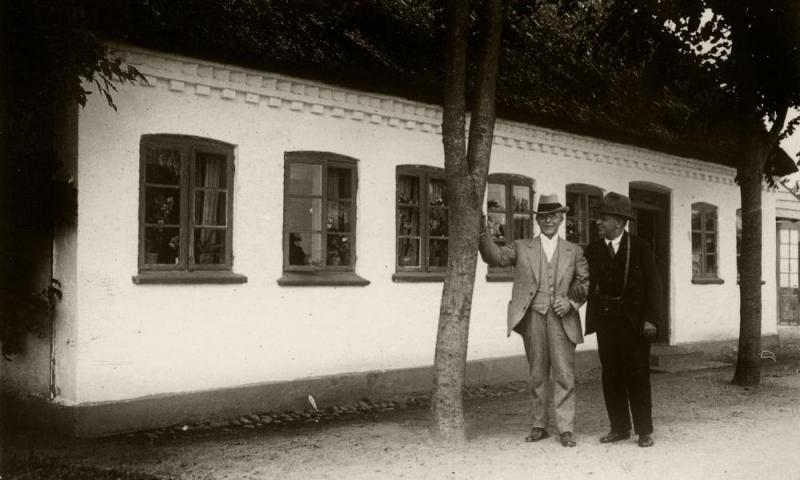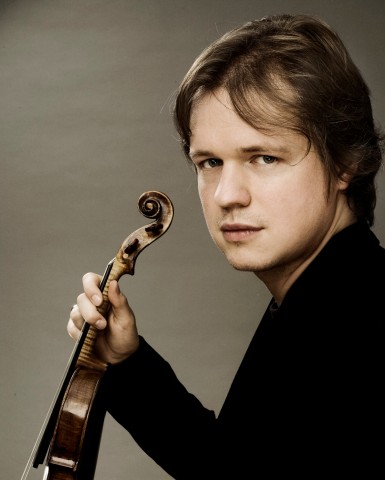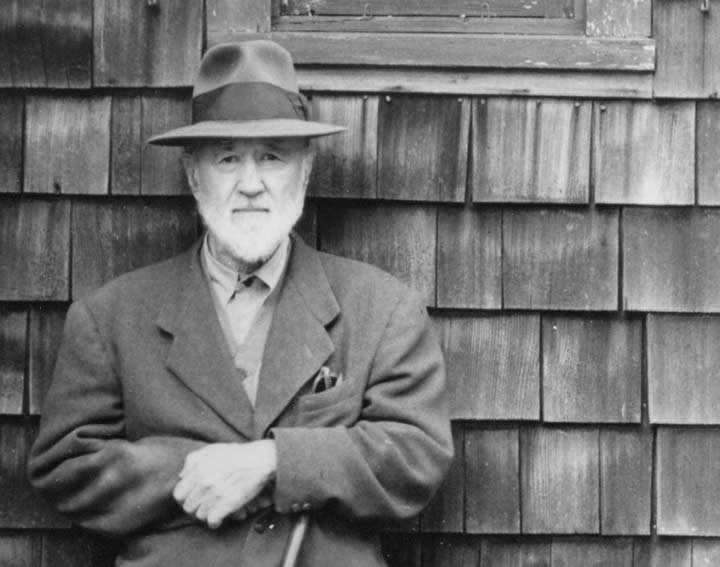Prom 72: Kraggerud, BBCSO, Litton | reviews, news & interviews
Prom 72: Kraggerud, BBCSO, Litton
Prom 72: Kraggerud, BBCSO, Litton
Despite large forces, sweetness and light were the keynotes in Nielsen and Ives

Queen Margrethe II of Denmark attended Nielsen’s 150th birthday concert earlier this year in Copenhagen’s glorious new concert hall. Her grandparents were there at the premiere of Nielsen’s blithest work, his cantata Springtime in Funen on 1921.
Springtime in Funen is a sparkling gem, a neatly-proportioned celebration of the very special island on which Nielsen was born as aphoristic, as clear and at moments as philosophical as his little masterpiece of autobiography about his early life, My Funen Childhood (its English translation disgracefully remaining out of print in this anniversary year). The various solos are lovely, artistic refashionings of the kind of quasi-folksongs he wrote which ever Dane seems to know and love; highlight among the three soloists' contributions were the three verses of the tenor’s “The mild day is bright and long” so deliciously varied by Ben Johnson.
 Even more treasurable, perhaps, are the orchestral links and especially the clarinet refrain to “The Blind Fiddler” – a portrait of a character young Nielsen knew well – executed with all his usual nuanced phrasing by the BBC Symphony Orchestra’s James Burke. And the moment to shed a tear or two is the a cappella male voice chorus of elders who “bend towards the dust and long for rest eternal”. The BBC Singers were matched for clarity by the boys and girls of Tiffin School(s), who should have been thrown an extra bone in the shape of Nielsen’s simpler songs to balance the American hymns of the concert’s second half. Maybe there wasn’t a Dane in sight, but this all felt easily authentic under Andrew Litton’s unaffected baton.
Even more treasurable, perhaps, are the orchestral links and especially the clarinet refrain to “The Blind Fiddler” – a portrait of a character young Nielsen knew well – executed with all his usual nuanced phrasing by the BBC Symphony Orchestra’s James Burke. And the moment to shed a tear or two is the a cappella male voice chorus of elders who “bend towards the dust and long for rest eternal”. The BBC Singers were matched for clarity by the boys and girls of Tiffin School(s), who should have been thrown an extra bone in the shape of Nielsen’s simpler songs to balance the American hymns of the concert’s second half. Maybe there wasn’t a Dane in sight, but this all felt easily authentic under Andrew Litton’s unaffected baton.
For experience versus innocence, we had the equally natural outpouring of Norwegian violinist Henning Kraggerud (pictured above by Observatoriet/Simax Classics) in Nielsen’s Violin Concerto (actually an earlier masterpiece of 1911, but still a work of maturity where the style is always the man). It’s not surprising given the almost constant flow of solo line that Kraggerud used a score, which meant a turning away from the side of the hall on which I was setting so that the tone didn’t always project effortlessly. But his character came through so vividly as he duetted happily with BBC woodwind so far back on the platform, and the cadenzas proved stunningly unorthodox. As is most of the piece: you just have to go with the flow in the first part, but you know where you are with a rondo theme of memorable, utterly Nielsenesque distinction. A jacket discarded some way through said it all: Nielsen’s music has to be unbuttoned, and this lovable performance certainly was. Kraggerud never collected his jacket onstage, but he did return to play an encore that has stuck in my mind - and how often can you say this of a new piece? - the Postlude No 10 from a work I have to hear, his own Equinox.
 Charles Ives’s wildly ambitious, polytonal and polyrhythmic Fourth Symphony was the zenith of the programme in scale and ambition if not necessarily in substance (the composer pictured left in old age). Not premiered until 1965, over a decade after the composer’s death - odd that the programme note didn't enlighten us on its fascinating assemblage - it's a piece made for the spaces of the Albert Hall and has had no shortage of performances here. Litton’s had an extra piquancy for being prefaced by four of the American hymns embedded as hooks in the symphony’s denser-textured movements. These simple national treasures were sung with focused zest, and American vowels to match, by the superb Crouch End Festival Chorus before Litton, assisted by second conductor Fergus Macleod and his spectral, moveable ensemble, plunged straight into Ives’s chorus-dominated first movement. The segue reinforced memories of a similarly daring Proms programme from the Danish National Symphony Orchestra in which Ligeti flowed without applause into Kraggerud’s briskly ethereal performance of Tchaikovsky’s Violin Concerto.
Charles Ives’s wildly ambitious, polytonal and polyrhythmic Fourth Symphony was the zenith of the programme in scale and ambition if not necessarily in substance (the composer pictured left in old age). Not premiered until 1965, over a decade after the composer’s death - odd that the programme note didn't enlighten us on its fascinating assemblage - it's a piece made for the spaces of the Albert Hall and has had no shortage of performances here. Litton’s had an extra piquancy for being prefaced by four of the American hymns embedded as hooks in the symphony’s denser-textured movements. These simple national treasures were sung with focused zest, and American vowels to match, by the superb Crouch End Festival Chorus before Litton, assisted by second conductor Fergus Macleod and his spectral, moveable ensemble, plunged straight into Ives’s chorus-dominated first movement. The segue reinforced memories of a similarly daring Proms programme from the Danish National Symphony Orchestra in which Ligeti flowed without applause into Kraggerud’s briskly ethereal performance of Tchaikovsky’s Violin Concerto.
The Albert hall haloed to perfection, fortunately not to murk, the vintage Ives mixture of seemingly amorphous density with snatches of band music and popular songs. If the ambitious cosmic finale doesn’t really add to what’s been said in the vortex of the second movement, where trumpets swayed their parade music, the very tonal, even old-fashioned slow-movement “Fugue” (very much with inverted commas) between them was oddly moving. Sweet and tender, in fact, were the keynotes of this remarkable Prom, for all its massing of forces.
Read theartsdesk's reviews of other concerts from the BBC Proms 2015
rating
Share this article
The future of Arts Journalism
You can stop theartsdesk.com closing!
We urgently need financing to survive. Our fundraising drive has thus far raised £33,000 but we need to reach £100,000 or we will be forced to close. Please contribute here: https://gofund.me/c3f6033d
And if you can forward this information to anyone who might assist, we’d be grateful.

Subscribe to theartsdesk.com
Thank you for continuing to read our work on theartsdesk.com. For unlimited access to every article in its entirety, including our archive of more than 15,000 pieces, we're asking for £5 per month or £40 per year. We feel it's a very good deal, and hope you do too.
To take a subscription now simply click here.
And if you're looking for that extra gift for a friend or family member, why not treat them to a theartsdesk.com gift subscription?
more Classical music
 St Matthew Passion, Irish Baroque Orchestra, Whelan, St Patrick’s Cathedral, Dublin review - the heights rescaled
Helen Charlston and Nicholas Mulroy join the lineup in the best Bach anywhere
St Matthew Passion, Irish Baroque Orchestra, Whelan, St Patrick’s Cathedral, Dublin review - the heights rescaled
Helen Charlston and Nicholas Mulroy join the lineup in the best Bach anywhere
 Kraggerud, Irish Chamber Orchestra, RIAM Dublin review - stomping, dancing, magical Vivaldi plus
Norwegian violinist and composer gives a perfect programme with vivacious accomplices
Kraggerud, Irish Chamber Orchestra, RIAM Dublin review - stomping, dancing, magical Vivaldi plus
Norwegian violinist and composer gives a perfect programme with vivacious accomplices
 Small, Hallé, Wong, Bridgewater Hall, Manchester review - return to Shostakovich’s ambiguous triumphalism
Illumination from a conductor with his own signature
Small, Hallé, Wong, Bridgewater Hall, Manchester review - return to Shostakovich’s ambiguous triumphalism
Illumination from a conductor with his own signature
 LSO, Noseda, Barbican review - Half Six shake-up
Principal guest conductor is adrenalin-charged in presentation of a Prokofiev monster
LSO, Noseda, Barbican review - Half Six shake-up
Principal guest conductor is adrenalin-charged in presentation of a Prokofiev monster
 Frang, LPO, Jurowski, RFH review - every beauty revealed
Schumann rarity equals Beethoven and Schubert in perfectly executed programme
Frang, LPO, Jurowski, RFH review - every beauty revealed
Schumann rarity equals Beethoven and Schubert in perfectly executed programme
 Levit, Sternath, Wigmore Hall review - pushing the boundaries in Prokofiev and Shostakovich
Master pianist shines the spotlight on star protégé in another unique programme
Levit, Sternath, Wigmore Hall review - pushing the boundaries in Prokofiev and Shostakovich
Master pianist shines the spotlight on star protégé in another unique programme
 Classical CDs: Big bands, beasts and birdcalls
Italian songs, Viennese chamber music and an enterprising guitar quartet
Classical CDs: Big bands, beasts and birdcalls
Italian songs, Viennese chamber music and an enterprising guitar quartet
 Connolly, BBC Philharmonic, Paterson, Bridgewater Hall, Manchester review - a journey through French splendours
Magic in lesser-known works of Duruflé and Chausson
Connolly, BBC Philharmonic, Paterson, Bridgewater Hall, Manchester review - a journey through French splendours
Magic in lesser-known works of Duruflé and Chausson
 Biss, National Symphony Orchestra, Kuokman, NCH Dublin review - full house goes wild for vivid epics
Passionate and precise playing of Brahms and Berlioz under a dancing master
Biss, National Symphony Orchestra, Kuokman, NCH Dublin review - full house goes wild for vivid epics
Passionate and precise playing of Brahms and Berlioz under a dancing master
 Verdi Requiem, Philharmonia, Muti, RFH review - new sparks from an old flame
Discoveries on a veteran maestro's epic journey
Verdi Requiem, Philharmonia, Muti, RFH review - new sparks from an old flame
Discoveries on a veteran maestro's epic journey
 Batsashvili, Hallé, Wong, Bridgewater Hall, Manchester review - a star in the piano universe
The Georgian pianist brings precision and freedom to Liszt’s warhorses
Batsashvili, Hallé, Wong, Bridgewater Hall, Manchester review - a star in the piano universe
The Georgian pianist brings precision and freedom to Liszt’s warhorses
 Naumov, SCO, Egarr, Queen's Hall, Edinburgh review - orchestral magic rescues some punishing music
Hard-driven Beethoven, monotonous Eötvös, some light from Kernis
Naumov, SCO, Egarr, Queen's Hall, Edinburgh review - orchestral magic rescues some punishing music
Hard-driven Beethoven, monotonous Eötvös, some light from Kernis

Add comment